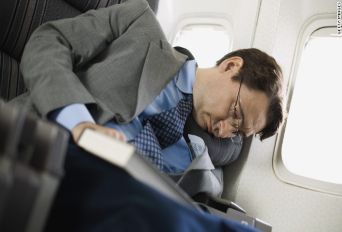When you board your flight, one of the best ways to pass the time is to catch up on much-needed sleep, especially after a layover or tiring business trip.
While some travellers can fall asleep easily despite all sorts of noise, others aren’t so lucky. Maybe your seatmates can’t stay still, your fellow passengers are loud, babies are crying, or your seat may be cramped. However, there are times when it’s your own mistakes keeping you from floating away into dreamland.
Have a look at the following mistakes that are stopping you from sleeping while flying.
8 Reasons Why You Can’t Sleep on a Plane
Find it difficult to fly and sleep? Make sure the following mistakes aren’t keeping you awake.
1) Staring at Screens
Whether it’s your smartphone, tablet, laptop or the TV in your seat-back, staring at screens that emit blue light messes with your body’s natural sleep hormones and sabotages your slumber. Instead, rest your eyes and brain. If you can’t slow down your thoughts unaided, try reading a book.
2) Enjoying Some Drinks
While alcohol might seem like a good way to get sleepy, it has the opposite effect.
Sure, it may make nodding off after departure a bit easier but it won’t provide the quality of sleep you need. In fact, consuming alcohol before sleeping will dehydrate you, exaggerate jetlag and disturb your overall sleep pattern. The combination of cabin pressure and boozing can make you feel bloated and trigger frequent restroom visits, thus reducing your sleep time.
3) Drinking Coffee
No matter how tempting it may be to visit Starbucks before boarding or order a cup of joe onboard, avoid coffee if your goal is sleep.
It’s no secret that coffee keeps you awake, so make sure you have no caffeine in your system. Steer clear of carbonated drinks and chocolate, too, both of which will keep you buzzed on caffeine and sugar. Try herbal tea or warm milk instead.
4) Picking the Wrong Seat
If you’re unlucky enough to be seated between strangers, say goodbye to sleep. Sitting on the aisle isn’t your best bet either. Interestingly, where you’re seated plays a vital role in determining your sleep quality. Your most nap-optimistic option is to choose a window seat if you can. This gives you control over the window shade, plus you don’t have to worry about allowing fellow seatmates access to the aisle. Simply lean against the side of the plane and (try to) catch some z’s on a comfortable pillow.

5) Not Preparing Well
To minimize disturbances and jetlag, and to keep you from worrying about random things, don’t travel unprepared. Here are a few suggestions.
- Bring earplugs/noise-canceling earphones, an eye mask and a neck pillow.
- Wake up earlier than usual the morning of your flight to shift your sleep cycle and mitigate jetlag.
- Make reservations in advance so you don’t have to worry about them upon reaching your destination; for example, booking a hotel room or hiring an airport limo.
6) Wearing Uncomfortable Clothes
Not a celebrity? Then don’t worry about your airport look.
Many passengers make the mistake of being fashionable, not comfortable, when travelling. This doesn’t mean showing up in pyjamas and bunny slippers. Just wear something comfortable to get the maximum coziness required to fall asleep. Focus on elasticity and wear slip-on shoes so you can take them off easily if needed.
7) Eating a Heavy Meal
We’ve already discussed what not to drink on a plane. But what about eating?
Some people like downing a meal rich in carbs, which will quickly release sugar, creating an insulin spike followed by a crash. This will boost tryptophan and serotonin, two brain chemicals involved in sleep, but it also increases your chances of indigestion which can lead to you not sleeping. Your best bet? Avoid heavy meals before or during the flight.
8) Taking Sleeping Pills
Avoid medicating yourself to sleep.
Many people turn to sleeping pills to get through a long-haul flight. But some medications, like Ambien, are meant to last a long time to help insomniacs stay asleep. Knocking yourself out with these pills can lead to several hours of immobility in the lower part of your legs which increases your risk of deep vein thrombosis. They can also leave you feeling too groggy to care for yourself upon deplaning or during an emergency.
Whether you’re flying for business or pleasure, catching on your sleep is probably one of the best ways to pass flight time. But not everyone is lucky enough be able to snooze and fly. Even if you are, making these mistakes can lessen your chance of cozy slumber. Avoid them at all costs.

